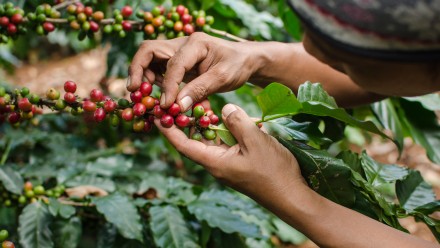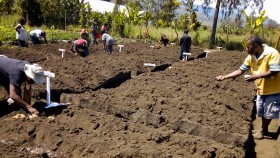Improving rural livelihoods via exploring carbon sequestration and trading opportunities in PNG's coffee industry
The PNG Government has begun to develop policies to encourage greater agricultural production in order to attain and maintain national income security after the end of mining and liquefied natural gas (LNG) booms. Enhancing agricultural food production has been identified as a priority in the current Medium-Term Development Plan III (2018-2022), National Development Plan (2016-2030) and Vision 2050.
As part of these plans, a number of key developments must take place. These include:
- Expanding social protection measures to build local food system resili ence and monitor local food prices for early warning signs of reduced access and/or availability.
- Future-proofing food value chains by facilitating local supply of nutritious food.
- Using agriculture and fisheries to deliver sustainable social protection outcomes and enhance agency of local communities and regional players in decision-making.
In order for these goals to be realised, the downward trend in agricultural productivity must be halted, new markets (both domestic and international) must be identified, and new products must be introduced and commercialisation opportunities must be explored. To achieve improved productivity, farmers must be able to explore new technologies, inputs, and management. This is unlikely to occur if farmers lack higher levels of disposable income to invest in these new options. Incomes are unlikely to rise without significant improvement in either agricultural commodity prices or some form of additional income from existing agricultural activities.
This project will examine the prospect of the establishment of carbon sequestration and trading with smallholder PNG coffee growers and the broader coffee industry as a way of generating further income. This income could support improved food security outcomes from enhanced social security in rural communities.
If access to trading markets are possible, then improvements in rural livelihoods could also flow back into improved agricultural practices and thus further improve productivity. By working with the Coffee Industry in this project, we are establishing robust methods for establishing sequestration values, and examining how carbon trading could be realised from both scientific (i.e. measurements, monitoring, and validation) and policy perspectives.
The project will achieve three key objectives:
- The establishment of a robust baseline rate of carbon accumulation in Arabica coffee trees, in order to allow the determination of a robust estimate of cost/benefit.
- The examination of governing/legislative frameworks required to establish an independent international trading scheme for PNG smallholder farmers.
- The examination of the capacity building and training required to ensure carbon certification and accreditation with PNG smallholders?
Partners: ANU, Sustineo, Roots Organic Products Inc., Fairtrade, Natural Carbon, University of Goroka
Funding Agency: DFAT














